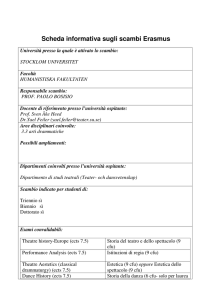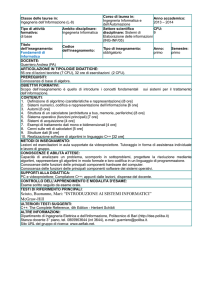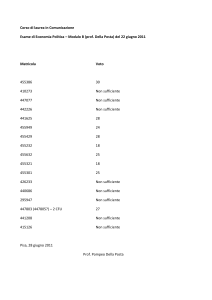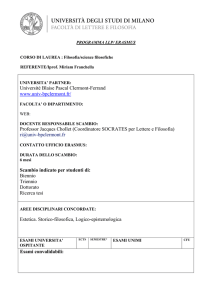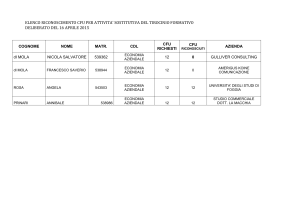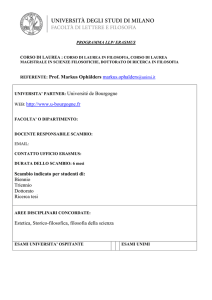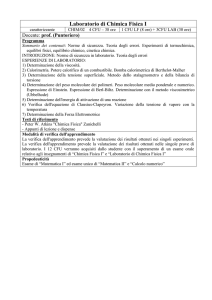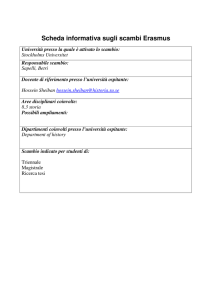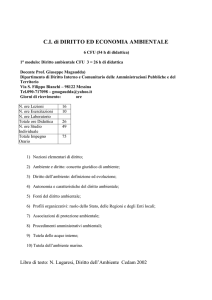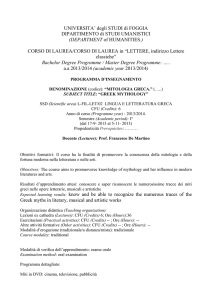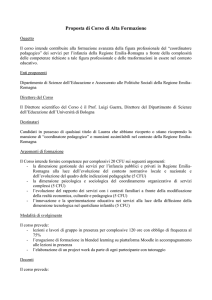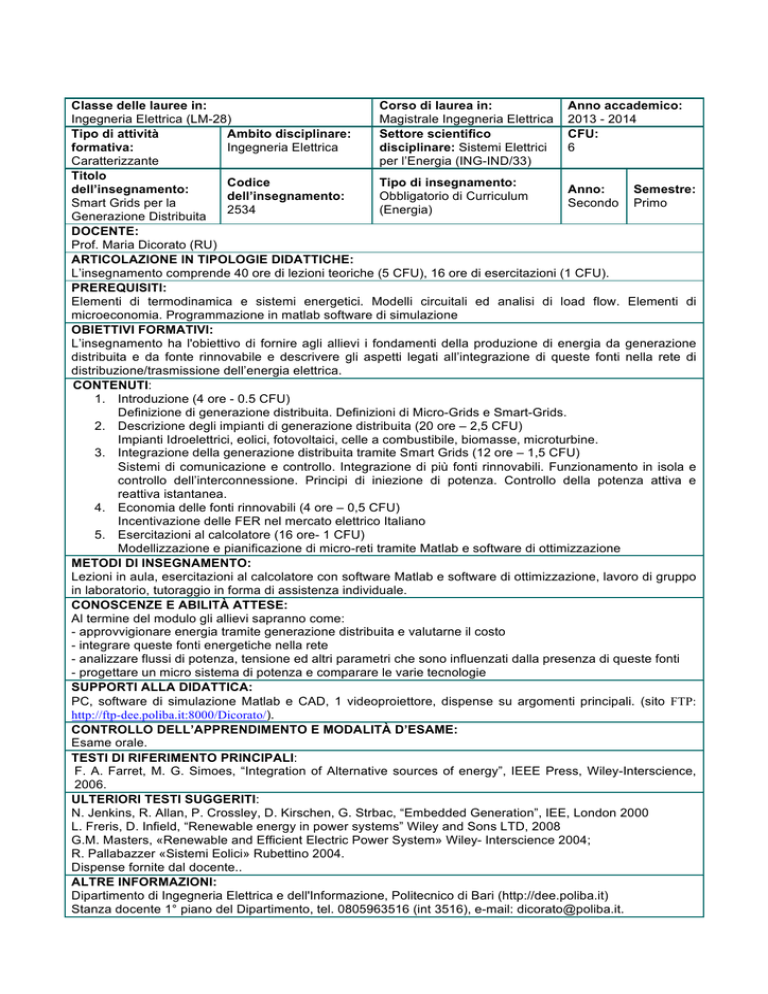
Classe delle lauree in:
Corso di laurea in:
Anno accademico:
Ingegneria Elettrica (LM-28)
Magistrale Ingegneria Elettrica 2013 - 2014
Tipo di attività
Ambito disciplinare:
Settore scientifico
CFU:
formativa:
Ingegneria Elettrica
disciplinare: Sistemi Elettrici
6
Caratterizzante
per l’Energia (ING-IND/33)
Titolo
Codice
Tipo di insegnamento:
dell’insegnamento:
Anno:
Semestre:
dell’insegnamento:
Obbligatorio di Curriculum
Smart Grids per la
Secondo Primo
2534
(Energia)
Generazione Distribuita
DOCENTE:
Prof. Maria Dicorato (RU)
ARTICOLAZIONE IN TIPOLOGIE DIDATTICHE:
L’insegnamento comprende 40 ore di lezioni teoriche (5 CFU), 16 ore di esercitazioni (1 CFU).
PREREQUISITI:
Elementi di termodinamica e sistemi energetici. Modelli circuitali ed analisi di load flow. Elementi di
microeconomia. Programmazione in matlab software di simulazione
OBIETTIVI FORMATIVI:
L’insegnamento ha l'obiettivo di fornire agli allievi i fondamenti della produzione di energia da generazione
distribuita e da fonte rinnovabile e descrivere gli aspetti legati all’integrazione di queste fonti nella rete di
distribuzione/trasmissione dell’energia elettrica.
CONTENUTI:
1. Introduzione (4 ore - 0.5 CFU)
Definizione di generazione distribuita. Definizioni di Micro-Grids e Smart-Grids.
2. Descrizione degli impianti di generazione distribuita (20 ore – 2,5 CFU)
Impianti Idroelettrici, eolici, fotovoltaici, celle a combustibile, biomasse, microturbine.
3. Integrazione della generazione distribuita tramite Smart Grids (12 ore – 1,5 CFU)
Sistemi di comunicazione e controllo. Integrazione di più fonti rinnovabili. Funzionamento in isola e
controllo dell’interconnessione. Principi di iniezione di potenza. Controllo della potenza attiva e
reattiva istantanea.
4. Economia delle fonti rinnovabili (4 ore – 0,5 CFU)
Incentivazione delle FER nel mercato elettrico Italiano
5. Esercitazioni al calcolatore (16 ore- 1 CFU)
Modellizzazione e pianificazione di micro-reti tramite Matlab e software di ottimizzazione
METODI DI INSEGNAMENTO:
Lezioni in aula, esercitazioni al calcolatore con software Matlab e software di ottimizzazione, lavoro di gruppo
in laboratorio, tutoraggio in forma di assistenza individuale.
CONOSCENZE E ABILITÀ ATTESE:
Al termine del modulo gli allievi sapranno come:
- approvvigionare energia tramite generazione distribuita e valutarne il costo
- integrare queste fonti energetiche nella rete
- analizzare flussi di potenza, tensione ed altri parametri che sono influenzati dalla presenza di queste fonti
- progettare un micro sistema di potenza e comparare le varie tecnologie
SUPPORTI ALLA DIDATTICA:
PC, software di simulazione Matlab e CAD, 1 videoproiettore, dispense su argomenti principali. (sito FTP:
http://ftp-dee.poliba.it:8000/Dicorato/).
CONTROLLO DELL’APPRENDIMENTO E MODALITÀ D’ESAME:
Esame orale.
TESTI DI RIFERIMENTO PRINCIPALI:
F. A. Farret, M. G. Simoes, “Integration of Alternative sources of energy”, IEEE Press, Wiley-Interscience,
2006.
ULTERIORI TESTI SUGGERITI:
N. Jenkins, R. Allan, P. Crossley, D. Kirschen, G. Strbac, “Embedded Generation”, IEE, London 2000
L. Freris, D. Infield, “Renewable energy in power systems” Wiley and Sons LTD, 2008
G.M. Masters, «Renewable and Efficient Electric Power System» Wiley- Interscience 2004;
R. Pallabazzer «Sistemi Eolici» Rubettino 2004.
Dispense fornite dal docente..
ALTRE INFORMAZIONI:
Dipartimento di Ingegneria Elettrica e dell'Informazione, Politecnico di Bari (http://dee.poliba.it)
Stanza docente 1° piano del Dipartimento, tel. 0805963516 (int 3516), e-mail: [email protected].
Degree class:
Electrical engineering
Master level (two year)
degree:
Electrical engineering
Scientific Discipline Sector:
Power Systems (ING-IND/33)
Type of course:
Compulsory for the Curriculum
(Energy)
Academic year:
2013 - 2014
Type of course
Disciplinary area:
ECTS Credits:
Characterizing
Electrical engineering
6
Title of the course:
Code:
Year:
Semester:
Smart Grids for
nd
st
2534
2
1
Distributed Generation
LECTURER:
Prof. Maria Dicorato (Assistant Professor)
HOURS OF INSTRUCTION
Total number of hours: 56. Theory: 40 hours (5 ECTS). Numerical applications: 16 hours (1 ECTS).
PREREQUISITES:
Steady-state and transient analysis techniques of single-phase and three-phase circuits. Principles of
thermodynamics. Microeconomic elements. Basic use of Matlab and software simulator..
AIMS:
The course aims to provide students with the fundamentals of energy production from renewable sources and
distributed generation and describe the aspects related to the integration of these sources into the distribution
network / transmission of electricity. Examples of micropower system design such as smart grid framework
will be provided.
CONTENTS:
1. Introduction (4 hours - 0.5 ECTS)
Definition of distributed generation. Definitions of Micro-Grids and Smart-Grids.
2. Description of distributed generation (20 hours - 2.5 ECTS)
Hydropower, wind, photovoltaic, fuel cells, biomass, microturbines.
3. Integration of distributed generation through Smart Grids (12 hours - 1.5 ECTS)
Systems of communication and control. Integration of multiple renewable sources. Island operation
and control of the interconnection. Principles of power injection. Control of active and reactive power.
4. Economics of renewable energy sources (4 hours - 0.5 ECTS)
Incentives of RES in the Italian electricity market framework
5. Numerical applications (16 hours-1 ECTS)
Modelling and planning of micro-networks using Matlab and optimization software
TEACHING METHODS:
Lectures, supported by transparencies and projector, laboratory team-works, personalized feedback and
coaching to improve every aspect of the student's work.
EXPECTED OUTCOME AND SKILL:
At the end of the course a successful student should have developed a good ability to choose transformers,
generators and motors for industrial applications, execute laboratory tests and determine the principal
characteristics.
TEACHING AIDS:
PCs, simulation software Matlab, projector, , scripts referring to principal topics (web site: http://ftpdee.poliba.it:8000/Dicorato)
EXAMINATION METHOD:
Oral exam.
BIBLIOGRAPHY:
F. A. Farret, M. G. Simoes, “Integration of Alternative sources of energy”, IEEE Press, Wiley-Interscience,
2006
FURTHER BIBLIOGRAPHY:
N. Jenkins, R. Allan, P. Crossley, D. Kirschen, G. Strbac, “Embedded Generation”, IEE, London 2000
L. Freris, D. Infield, “Renewable energy in power systems” Wiley and Sons LTD, 2008
Lecture course text
FURTHER INFORMATION:
Department of Electrical and Information Engineering, Politecnico di Bari (http://dee.poliba.it)
Lecturer room at 1st floor, phone 0805963516 (int. 3516), e-mail: [email protected].

